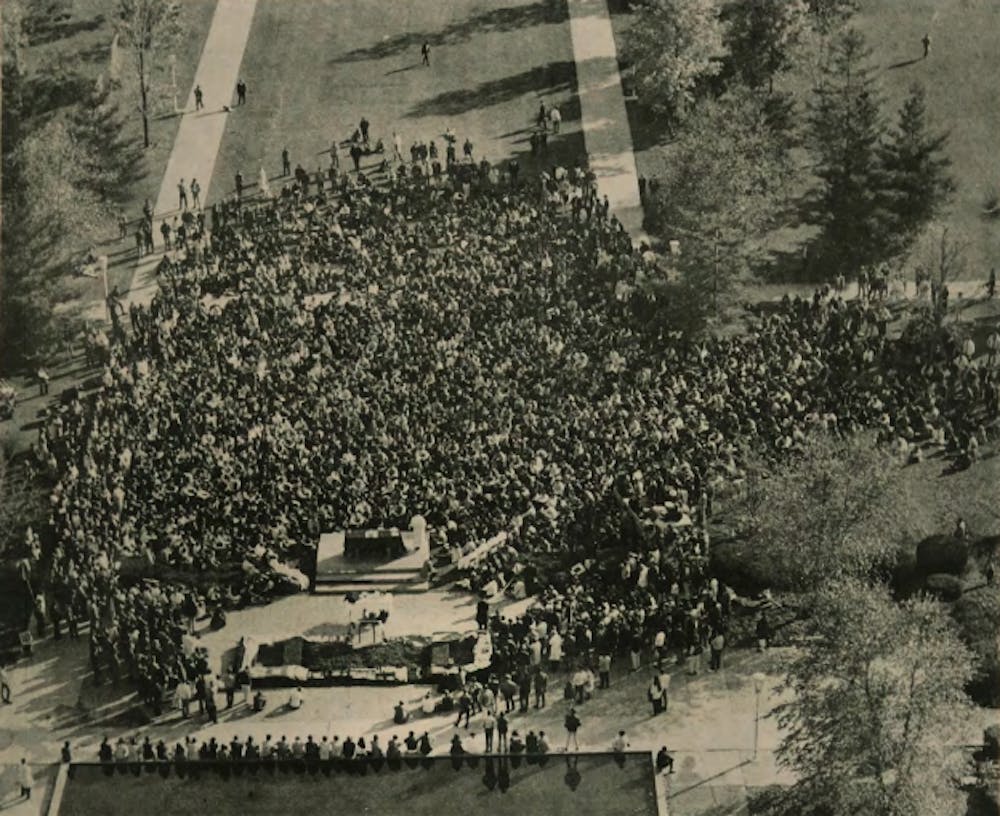Here’s what my friends and I remember from last week’s presidential debate: eating dogs, love letters to Kim Jong Un, a memed moment of hesitance and mere “concepts of a plan.”
The debate heightened the effects of the November election even more. Battleground states are highly contested, swing voters are deciphering the candidates’ performances and America’s youth remains politically energized.
According to youth voting research organization Tufts CIRCLE, 57% of American youth aged 18 to 24 are “extremely likely” to vote and an additional 15% are “fairly likely” to vote this November.
The Notre Dame student body is certainly filled with mobilized voters, wielding perspectives and political ideologies originating from many corners of the world. A plethora of beliefs — immersed in a spirit of educating the heart — is what distinguishes Notre Dame. In this way, pillars of Notre Dame’s Catholic mission statement energize the pursuit of the common good.
In this light, I ask the following:
Has Notre Dame sustained being a microcosm of the nation’s political youth — a student body wrapped in idealistic chains, invigorated to vote and yearning to pursue the common good from different political aims?
Seemingly, the answer is “yes.” We all believe our voices matter. We all desire a better society. We all are united by the tangible idea that we can participate in society’s advancement.
Common good
Notre Dame’s history is steeped in activism: most famously the Fifteen Minute Rule, decades of Israel-Gaza demonstrations and several protests following US presidential elections. With these displays, opinions on what defines the ”common good” often vary along partisan lines.
So, here’s a more intriguing question: why should Notre Dame students emphasize this election more so than previous and future elections?
In short, what’s different about this 47-day sprint to election day is the electorate’s three-part concoction: loyal candidate bases, swing voters and highly involved youth.
According to the Notre Dame mission statement, the university’s aim “is to create a sense of human solidarity and concern for the common good that will bear fruit as learning becomes service to justice.”
However, in comparison to other generations, Notre Dame’s student dialogue and involvement in the election appear minimal during an otherwise unprecedented time of youth participation.
Prior elections
On election day 2000, The Observer reported that 68% of 18 to 24-year-olds did not vote in the 1996 presidential election. The national statistic, though high, came during an era when Notre Dame students were more demonstrative with their ideas.
As votes were being recounted two days later, students openly voiced their complaints on the news media’s jumping to conclusions and Florida’s time table. Then student body president Brian O’Donoghue said the individual is crucial for the electoral system.
“What an amazing time to be a student voter,” he said. “This is history right now.”
And history is in the making once again. It’s an “amazing time” to be a student voter now, when margins are slim and votes, especially those in battleground states, have immense potential.
“People at this point who are undecided, won't vote at all or choose a candidate capriciously and there is no way that campaigns can predict that,” Sean Savage, a Saint Mary’s political science professor, said in The Observer eight days before the 2000 election. “The campaigns are most likely then to try to energize their base.”
Notre Dame students as a whole and as a part of presidential candidates’ bases aren’t as energized as they once were. Part of the 2024 election’s energy has most likely been transplanted online to the realms of meme culture and debate edits.
Uneasy state
At Notre Dame, little talk or action has sprung from recent events (except for some pro-Palestine demonstrations). For an unusual time in American politics, when Notre Dame students would have been vocal and active in years past, we aren’t.
While there may not be large sit-ins, riots or rallies regarding the election, it seems unusual that Notre Dame’s history of activism wouldn’t carry on in wake of recent events surrounding the election.
As Notre Dame students, we are naturally separated by our outlooks on life, but we are also united in the pursuit of a common good.
Ahead of November, the Notre Dame student body should consider using their votes as a means of sustaining a legacy of activism and political participation to foster change and justice — all sculpted by our ways of understanding and knowing.
Redmond (Reddy) Bernhold is a junior studying biochemistry and journalism. He originally hails from Minster, Ohio but calls Siegfried Hall his home on campus. When not writing, he explores South Bend coffee shops and thrift stores. You can contact Reddy at rbernho2@nd.edu.










